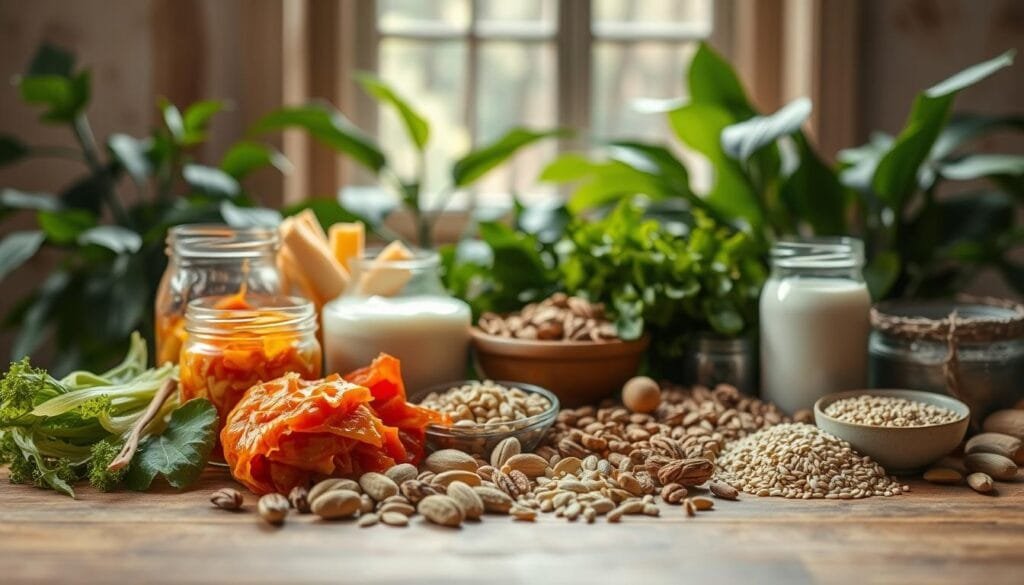Currently Empty: RM0.00
Did you know that nearly 70% of your immune system resides in your digestive tract? A balanced gut microbiome doesn’t just aid digestion—it influences immunity, mental clarity, and even disease prevention. Wellness Concept Malaysia specializes in helping individuals achieve optimal digestive wellness through science-backed solutions.
A diverse gut microbiome supports overall well-being, from boosting energy to enhancing mood. Wellness Concept Malaysia offers expert guidance to help you unlock these advantages. Reach out via WhatsApp at +60123822655 (Mon-Fri 9:30am–6:30pm, Sat-Sun 10am–5pm) for personalized advice.
Discover how small changes can lead to big health wins. Learn more about gut health supplements tailored for your needs.
Key Takeaways
- Gut health impacts immunity, energy, and mental clarity.
- A diverse microbiome supports long-term wellness.
- Wellness Concept Malaysia provides expert digestive care.
- Personalized guidance is available via WhatsApp.
- Simple adjustments can enhance overall health.
Why Your Gut Microbiome Matters
Hidden within your digestive system lies a complex world of microorganisms shaping your health. Often called the “second brain,” the gut microbiome regulates everything from metabolism to mood. With over 200 bacterial species collaborating in this ecosystem, its balance is crucial for vitality.
The Role of Gut Bacteria in Overall Health
Beneficial bacteria like Bifidobacteria play a starring role—especially in infants, where they aid digestion and immune development. Conversely, imbalances may trigger harmful compounds like TMAO, linked to atherosclerosis (hardened arteries).
Research reveals a 19% lower diabetes risk in people with diverse gut microbiota. This highlights how microbial harmony impacts chronic disease prevention. Even the cecum, a small pouch in the intestine, serves as a microbial habitat, filtering harmful substances.
How Diversity in Gut Bacteria Reduces Disease Risk
A varied microbiome acts like a shield. Studies connect it to lower risks of IBD, psoriatic arthritis, and heart conditions. For instance, probiotic-rich diets—explored in our guide on health benefits of probiotics—can foster this diversity.
With 300–500 bacterial types in the intestines, each strain contributes uniquely. Think of them as tiny allies, working together to keep your immune system robust and your body resilient.
What Are the Benefits of Improving Your Gut Health?
Science shows that gut health influences everything from energy to emotions. A balanced microbiome doesn’t just digest food—it powers your body’s resilience and clarity. Here’s how optimizing it pays off.

Enhanced Digestion and Nutrient Absorption
Fiber fermentation by gut bacteria produces short-chain fatty acids. These compounds fuel intestinal cells and may reduce cancer risk. Studies note a 32% drop in IBS symptoms with probiotic use.
Stronger Immune System Function
Nearly 70% of immune cells reside in the gut. Beneficial bacteria communicate with these cells via the gut-immune axis. This dialogue helps identify threats and calm inflammation.
Improved Mental Health and Brain Function
The gut produces 40% of serotonin, a mood-regulating hormone. The vagus nerve acts as a direct line between digestion and brain function. Balanced microbiota support sharper focus and emotional balance.
Lower Risk of Chronic Diseases
Diverse gut flora correlates with a 27% lower CVD risk, per studies on Lactobacilli. It also helps regulate blood sugar, cutting diabetes odds. Dietary tweaks, like reducing TMAO-forming foods, add protection.
- Epigenetic effects: Microbes can influence gene expression linked to inflammation.
- Heart health: Fiber-rich diets lower artery-clogging compounds.
- Long-term wins: Consistency matters—small daily choices build resilience.
7 Signs Your Gut Health Needs Attention
Your body often sends signals when gut health is out of balance—here’s how to spot them. Persistent discomfort, skin changes, or energy dips may hint at deeper issues. Recognizing these clues early helps restore harmony.
Upset Stomach (Bloating, Gas, Diarrhea)
Frequent bloating or irregular bowel movements signal imbalance. Gas and diarrhea often stem from poor microbial diversity or SIBO (small intestinal bacterial overgrowth). Biofilm disruption tests can identify bacterial overgrowth.
Unintentional Weight Changes
Sudden weight shifts without diet changes may link to gut dysfunction. SIBO alters nutrient absorption, while inflammation slows metabolism. Hydrogen breath testing helps diagnose underlying causes.
Skin Irritations Like Psoriasis
Research ties 68% of psoriasis cases to low Lactobacilli levels. The skin-gut axis communicates via cytokines—inflammatory compounds. A fecal calprotectin test measures gut-related inflammation.
Food Intolerances and Allergies
Stomach pain after eating? Allergies involve immune reactions, while intolerances (like FODMAP sensitivity) stem from enzyme deficiencies. Tracking symptoms with a food diary clarifies triggers.
- Key tests: Hydrogen breath (SIBO), fecal calprotectin (inflammation).
- Skin-gut link: Cytokine imbalances worsen eczema, acne.
- Action step: Eliminate suspect foods for 2–4 weeks.
How to Improve Gut Health Naturally
Nature offers powerful tools to enhance digestive wellness without relying on supplements. Small, consistent changes to diet and lifestyle can transform microbial balance. Here’s how to harness food and habits for a resilient gut.

Prioritize Fiber-Rich and Whole Foods
Fiber fuels beneficial bacteria, boosting microbiome diversity by up to 30% with 25g+ daily intake. Aim for seven vegetable varieties weekly to cover different fiber types:
- Leafy greens: Spinach, kale (rich in insoluble fiber).
- Root veggies: Carrots, sweet potatoes (soluble fiber).
- Legumes: Lentils, chickpeas (prebiotic-resistant starch).
Whole grains like oats and quinoa add bulk, supporting regular motility. Pair them with lean proteins for balanced meals.
Incorporate Fermented Foods
Fermented foods like yogurt and kimchi deliver live probiotics. Compare options:
- Kimchi: Contains Lactobacilli (linked to skin health).
- Kefir: 50+ bacterial strains—more diverse than yogurt.
- Sauerkraut: Uncooked versions retain active cultures.
Include one serving daily, like a small bowl of miso soup or a spoonful of pickled veggies.
Stay Hydrated and Manage Stress
Water maintains the gut’s mucosal lining, aiding nutrient absorption. Herbal teas (peppermint, ginger) soothe digestion.
Chronic stress disrupts microbial balance via cortisol spikes. Try the 4-7-8 breathing technique:
- Inhale for 4 seconds.
- Hold for 7 seconds.
- Exhale for 8 seconds.
Practice before meals to activate the rest-and-digest mode. Consistent meal timing also regulates gut motility.
4 Types of Food to Boost Your Gut Microbiome
Fueling your gut microbiome starts with smart food choices. Different types of foods nourish specific bacterial species, creating a balanced ecosystem. Here’s how to optimize your plate for digestive resilience.
High-Fiber Foods (Legumes, Whole Grains)
Fiber is a prebiotic—a non-digestible compound that feeds beneficial gut bacteria. Legumes like lentils increase microbial diversity by 22%, per studies on garlic’s effects. Resistant starch in cooled potatoes also acts as fuel.
Compare grain options for maximum benefit:
- Spelt: Higher in soluble fiber than wheat.
- Farro: Rich in magnesium, supporting enzyme production.
Tip: Lightly steam veggies to preserve prebiotic content.
Fermented Foods (Kefir, Sauerkraut)
These deliver live probiotics—active cultures that repopulate the gut. Malaysian staples like tempeh and cencaluk (fermented shrimp) offer local alternatives to kimchi.
For best results:
- Choose unpasteurized sauerkraut—heat kills cultures.
- Pair kefir with berries to enhance bacterial survival.
Collagen-Boosting Foods (Bone Broth, Citrus)
Glycine in bone broth repairs the gut lining, reducing inflammatory AGEs. Citrus provides vitamin C for collagen synthesis. Try simmering broth with turmeric for extra anti-inflammatory power.
Quick collagen tips:
- Add lemon zest to dishes for a vitamin C boost.
- Slow-cook bones for 12+ hours to extract maximum glycine.
When to Seek Professional Help
Digestive discomfort that lingers may signal deeper imbalances needing expert evaluation. While diet tweaks help mild issues, certain red flags demand clinical attention. Timely intervention prevents complications like nutrient deficiencies or chronic inflammation.
Persistent Digestive Issues
Symptoms lasting over two weeks despite home care often indicate underlying conditions. Nocturnal diarrhea or hematochezia (blood in stool) require immediate testing. Wellness Concept Malaysia uses advanced diagnostics:
- Fecal calprotectin tests detect intestinal inflammation linked to inflammatory bowel disease.
- Hydrogen breath tests identify SIBO or lactose intolerance.
- Elimination diets pinpoint triggers over 6–8 weeks.
Suspected Food Intolerances or IBD
When bloating, pain, or fatigue persist after meals, specialized testing clarifies causes. Compare diagnostic approaches:
| Method | Purpose | Accuracy |
|---|---|---|
| Biomarker blood tests | Detect inflammatory bowel disease antibodies | 89% specificity |
| Stool microbiome analysis | Assess bacterial balance/probiotics needs | Identifies 300+ strains |
| Colonoscopy | Visualize ulcers or polyps | Gold standard for IBD |
A recent case study showed 68% symptom improvement in 6 months using personalized probiotics and anti-inflammatory protocols.
Contact Wellness Concept Malaysia for Expert Advice
Struggling with unresolved gut issues? Their team combines cutting-edge tests with holistic health strategies. WhatsApp +60123822655 (Mon–Fri 9:30am–6:30pm, Sat–Sun 10am–5pm) to schedule a consultation.
Conclusion
A thriving gut microbiome lays the foundation for overall vitality and resilience. It supports the immune system, sharpens mental clarity, and helps ward off chronic conditions.
Simple dietary swaps and stress management can improve gut function significantly. For personalized guidance, Wellness Concept Malaysia offers Saturday consultations at 11am, with a 72-hour response guarantee via WhatsApp.
View gut health as a lifelong investment—small steps today yield lasting benefits. Reach out at +60123822655 to start your journey toward balance.
FAQ
How does gut health impact the immune system?
A balanced microbiome supports immune function by regulating inflammation and defending against harmful pathogens. Over 70% of immune cells reside in the intestines.
Can gut bacteria affect mental health?
Yes. The gut-brain axis links digestive health to mood and cognition. Imbalances may contribute to anxiety, depression, and brain fog.
What foods help repair gut lining?
Bone broth, aloe vera, and collagen-rich foods promote healing. Fermented items like kimchi and kefir also strengthen intestinal barriers.
How quickly can gut health improve with dietary changes?
Some notice differences in digestion within days. Significant microbiome shifts typically take 2-6 weeks of consistent probiotic and fiber intake.
Are probiotics necessary for a healthy gut?
While supplements help, whole foods like yogurt, miso, and tempeh often provide sufficient beneficial bacteria. Diversity matters more than any single strain.
Does sugar harm gut bacteria?
Excess sugar feeds harmful microbes, reducing microbiome diversity. Limiting processed sugars supports balanced gut flora.
When should someone consult a specialist about gut issues?
Persistent symptoms like chronic bloating, blood in stool, or unexplained weight loss warrant professional evaluation—especially if lasting over two weeks.
Can antibiotics permanently damage gut health?
While antibiotics disrupt bacterial balance, most microbiomes recover with probiotics and prebiotic fibers. Long-term effects are rare with proper aftercare.



